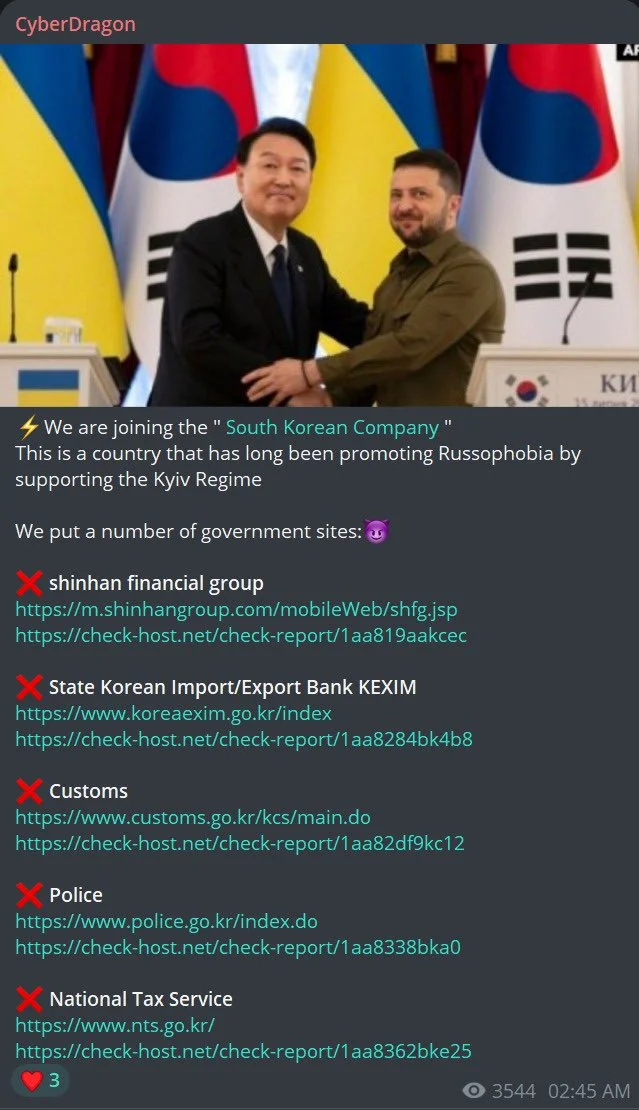CyberDragon Hacking Group Targets South Korea Over Ukraine Aid

CyberDragon hacking group targets South Korean sites over Ukraine support. Government, financial institutions, and Incheon Airport hit in DDoS attack. No data breach confirmation yet
Krishna Murthy June 13th, 2024

Share on LinkedInShare on Twitter
A notorious Chinese hacking group has reportedly gone on a cyber offensive against South Korea and targeted most of the country’s Government and financial sites. The CyberDragon hacking group has a mixture of Chinese and Russian ties and has been critically targeting countries that have been condemning Russia for the ongoing war in Ukraine.
South Korea President Yoon Suk Yeol had recently confirmed his country’s participation in a Ukraine peace summit in Switzerland this weekend to rally support for the country ending its war with Russia. Last year, Seoul had increased its Ukraine Aid package to $394 Million For 2024.
Government, Financial Sites Attacked by CyberDragon Hacking Group
Irked by its support being garnered against Russia, CyberDragon launched an extensive cyberattack on key South Korean sites and criticized the country for its alleged promotion of Russophobia.

In its post on darkweb, CyberDragon said, “We are joining the “South Korean Company”. This is a country that has long been promoting Russophobia by supporting the Kyiv regime.” The list of websites reportedly targetted by CyberDragon include:
Shinhan Financial Group: It was founded in September 2001 and is one of South Korea’s big five financial groups. Its subsidiaries provide a full range of financial services, including banking, securities, life insurance, and investment banking.
State Korean Import-Export Bank KEXIM: The Export-Import Bank of Korea, also commonly known as the Korea Eximbank (KEXIM), is the official export credit agency of South Korea. The bank was first established in 1976. Its primary purpose is to support South Korea’s export-led economy by providing loans, financing mega projects and thereby facilitating economic cooperation with other countries.

Home Page of Korea Eximbank
Korea Customs Service: The Korea Customs Service was established in 1970 and is one of tax organizations in South Korea and is run under the Ministry of Economy and Finance. The headquarters is in Seo District, Daejeon.
Korean National Police: The Korean National Police Agency (KNPA), also known as the Korean National Police (KNP), is one of the national police organizations in South Korea. It is run under the Ministry of the Interior and Safety and is headquartered in Seodaemun, Seoul.
National Tax Service: It is the tax organization in South Korea and is run under the Ministry of Economy and Finance. Its headquarters is in Sejong City.
Like many of the previous attacks carried out by the Cyberdragon hacking group, it is unclear if sensitive data of the organisations listed above was compromised. Prima Facie, it looks like the group carried out a DDoS attack meant to disrupt the platform’s services. None of the organizations have publicly responded to the alleged breach. Most of the organizations too seem to have restored the functioning of its websites, hours after the group claimed to have carried out a cyberattack.
Previous Operations by CyberDragon Hacking Group
The CyberDragon group gained popularity after it took down the website and app for almost 24 hours after a massive data breach in March 2024. CyberDragon had then posted evidence of the attack on its TOR platform but LinkedIn didn’t comment on the attack.
The peculiar hacking actor has both Chinese and Russian ties. It carries out cyberattacks with many pro-Russian hackers and most of its statements are posted in Russian. Both China and Russia are global allies and the targets of CyberDragon indicate their ideological and political affiliations. This scenario is, however, not new in the cybercrime world.
Organizations around the world must deal with the fallout of cyberattacks by groups like CyberDragon. Their attacks indicate why it is crucial to remain vigilant and implement stringent security measures against cyberattacks.





